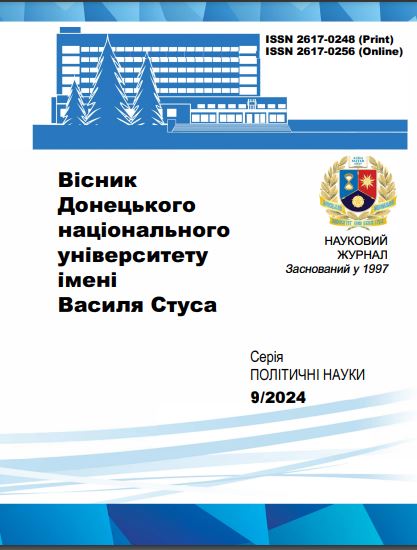Analysis of political debates in the context of behavioral theory of politics
DOI:
https://doi.org/10.31558/2617-0248.2024.9.15Keywords:
political debates, behavioral theory, political behavior, emotional appeals, rational arguments, cognitive biases, voter influenceAbstract
This article examines the political behavior of U.S. presidential candidates through the analysis of the debates between Kamala Harris and Donald Trump, held on September 10, 2024. The study focuses on the behavioral strategies employed by both candidates, which combine rational and irrational elements designed to influence voters through emotional and cognitive mechanisms. By applying behavioral concepts in the analysis, the study offers a deeper understanding of how political leaders manipulate emotions and stereotypes to secure electoral support.
The research reveals that Donald Trump extensively used emotional appeals to fear, anger, and patriotic sentiments, highlighting threats such as crime, immigration, and economic crisis. His statements included aggressive rhetoric aimed at portraying himself as a strong leader capable of decisive action. Trump also constructed an image of the Democrats as the enemy, accusing them of weakness and inability to defend national interests.
In contrast, Kamala Harris’s approach was more moderate and rational. She emphasized specific facts and pragmatic solutions, underscoring the importance of social justice, economic stability, and responsibility for the future. Harris used personal stories to evoke empathy, appealed to moral values, and highlighted the need to uphold democratic principles.
The study reveals that the behavioral strategies used during the debates have a profound influence on how voters behave politically. The analysis of both rational and irrational elements in the candidates’ behavior illustrates how politicians adapt their strategies to gain electoral support. The influence of emotions and cognitive biases underscores the importance of an interdisciplinary approach that integrates political science, psychology, and behavioral economics. Examining political debates through the lens of behavioral theory opens new avenues for understanding the impact of behavioral concepts on political processes.
References
ABC News. Harris-Trump presidential debate transcript. 2024. URL: https://abcnews.go.com/Politics/harris-trump-presidential-debate-transcript/story?id=113560542
Westen, D. The Political Brain: The Role of Emotion in Deciding the Fate of the Nation. PublicAffairs. 2008. 495 p.
Lakoff, G. Don't Think of an Elephant!: Know Your Values and Frame the Debate – The Essential Guide for Progressives. Chelsea Green Publishing. 2004. 143 p.
Levitsky, S., Ziblatt, D. How Democracies Die. Crown. 2018. 320 p.
Kahneman, D., Slovic, P., Tversky, A. Judgment Under Uncertainty: Heuristics and Biases. Cambridge University Press. 1982. 544 p.
Thaler, R. H. Misbehaving: The Making of Behavioral Economics. Norton & Company. 2015. 432 p.
Shiller, R. J. Irrational Exuberance. Crown Business. 2006. 336 p.
Lefebvre, V. Lectures on the Reflexive Games Theory. Leaf & Oaks Publishers. 2010. 220 p.
Nye, J. S. Soft Power and Great-Power Competition. Springer Singapore. 2023. 208 p.
Singer, P. Ethics in the Real World: 82 Brief Essays on Things That Matter. Princeton and Oxford: Princeton University Press. 2016. DOI: 1.037837025e-12.
Fisher, R. D., Ury, W. L., Patton, B. Getting to Yes: Negotiating Agreement Without Giving In. Penguin Books. 2011. 240 p.

